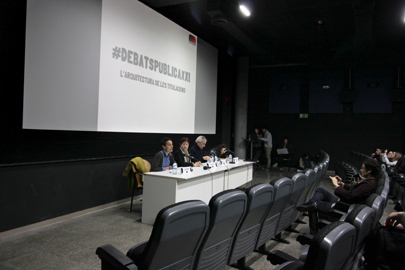Series of #debatspublicaXXI debates starts by discussing degree structure

01/12/2016
The debates known as #debatspublicaXXI began on 30 November with the first of three sessions in this series on the current situation of public universities in Catalonia. The aim of this project is to create a platform for debate where students can have their say and express their ideas, complaints and demands in relation to the situation of public universities in the 21st century.
The opening panel of speakers was formed by the UAB Rector, Margarita Arboix, the Vice-rector for Students and Employability, Sara Moreno, the Vice-Rector for Academic Programming and Quality, Josep Ros, and the member of the Technical Committee for the architecture degree, Mar Ampurdanès.
In her opening speech, Moreno highlighted the importance of students’ opinions, which are the real reason for the debates. “This series of debates allows students to express their ideas, complaints and demands in relation to public universities,” she said. The board of governors feel that there is a major need for such activities nowadays, considering how hard it is for students to afford to pay education fees. In the same vein, she pointed out that “among European countries, Spain has the highest cost per credit but the lowest number of grants.”
UAB Rector, Margarita Arboix, emphasized that the cost of masters courses is an essential aspect of the implementation of degree structures. “The UAB won’t accept a 3-year degree plus a mandatory two-year masters course unless the cost per credit of both courses is put on the same level,” she said. On behalf of the UAB, Vice-rector Josep Ros presented a report to inform students about the legal, economic, political and social framework affecting degree structure.
The member of the Technical Committee for the architecture degree, Mar Ampurdanès, concluded the presentation by thanking the new board of governors for listening to the students’ concerns in such difficult times: “The economic debate goes hand in hand with access to university,” she said. “Degree structure was an education reform carried out behind the students’ backs, who hadn’t had the time to consider the EHEA (European Higher Education Area).”
Different subjects under consideration
After the presentation, the students divided into five groups to discuss more concrete subjects. Each group had one moderator and one spokesman and the subjects discussed were: the cost of university education; degree structure; the university’s social purpose; teaching quality and employability; and the internationalization of the university.
Finally, the five groups gathered to share their conclusions. Some of the students’ thoughts related to the promotion of critical thinking at university, the struggle between the university’s social and productive purposes, and the disadvantages in relation to private universities. The debate was then concluded and everyone present was reminded about the second debate on 22 February, which will deal with student rights, duties and guarantees, and the third debate on 26 April, on student participation.
For further information on the #debatspublicaXXI series of debates, please visit our blog. Join the debates!
More information